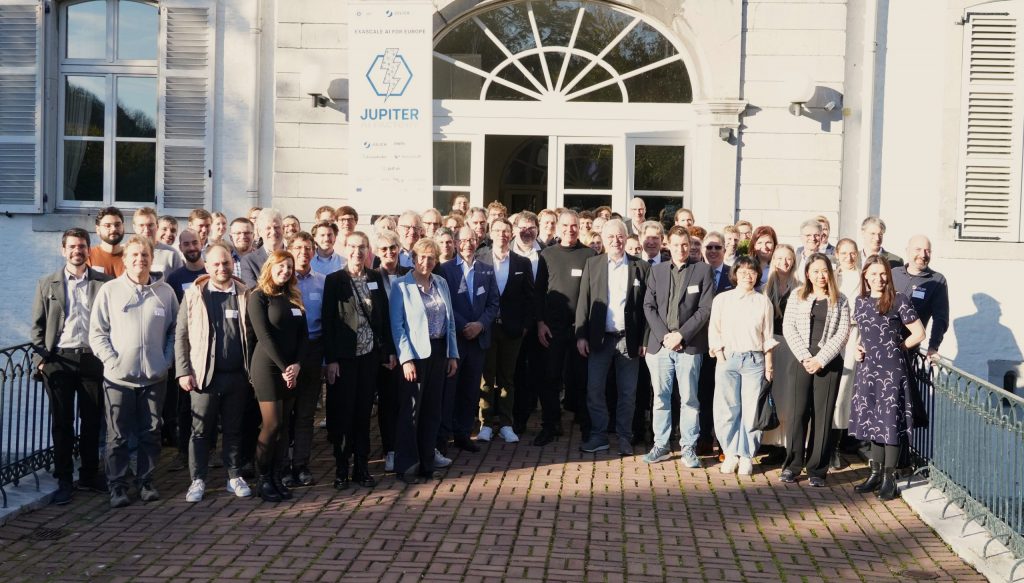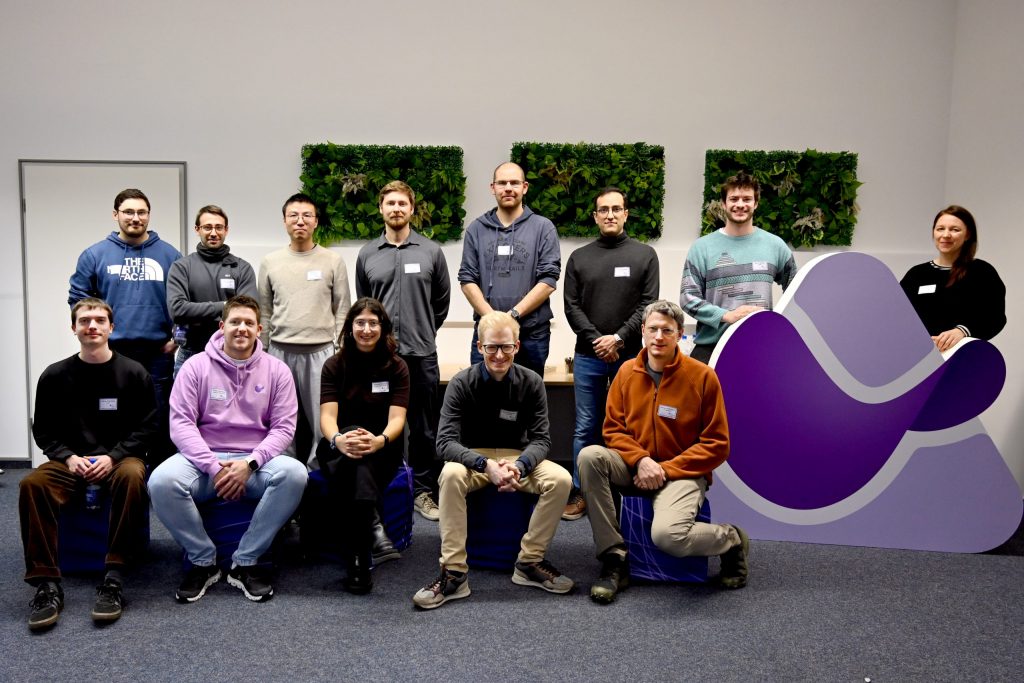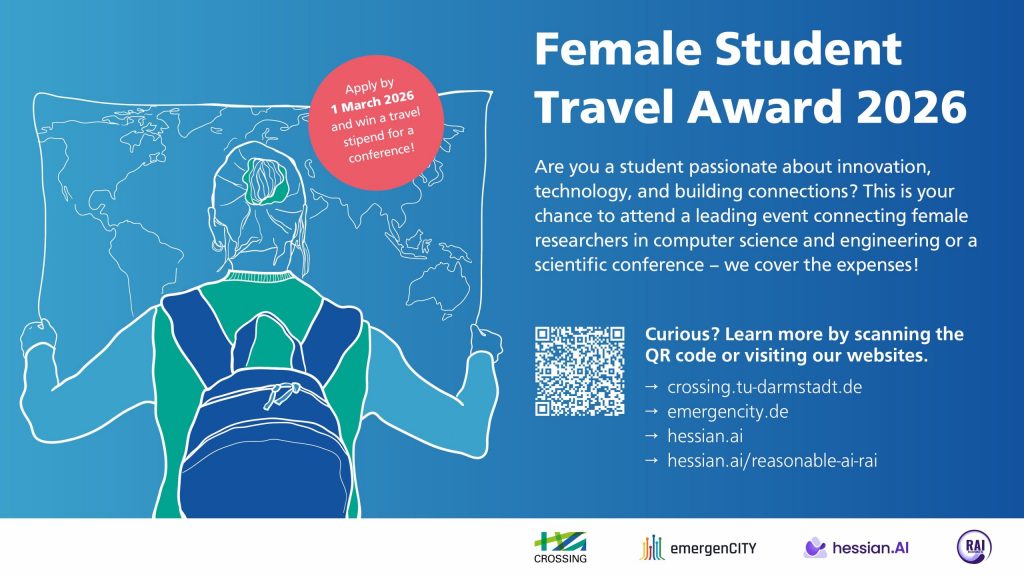
Consortium kick-off for the JUPITER AI Factory
JUPITER AI Factory gets underway: Consortium kick-off event on
7 November 2025, in Aachen
The kick-off event for the JUPITER AI Factory (JAIF) consortium took place on 7 November 2025. Following the ceremonial inauguration of the JUPITER exascale computer at the Forschungszentrum Jülich (FZJ) in September, JAIF has now been launched. Representatives from EuroHPC and the relevant ministries were able to participate in the event via a livestream. The launch of the JUPITER AI Factory marks an important milestone in the development of an independent European AI ecosystem.
JAIF is one of 19 AI factories (AIFs) in Europe, but the only one built around a European exascale supercomputer (JUPITER). JUPITER has been in early access since May, was officially inaugurated on September 5, 2025, at the Jülich Supercomputing Centre of the FZJ in North Rhine-Westphalia and is expected to undergo full technical acceptance in February 2026, thus leaving early access.
JAIF consortium partners are the Forschungszentrum Jülich (Jülich Supercomputing Centre – JSC), RWTH Aachen University (Center for Artificial Intelligence – AI Center), the Fraunhofer Institutes FIT (Institute for Applied Information Technology) and IAIS (Institute for Intelligent Analysis and Information Systems), and hessian.AI (the Hessian center for Artificial Intelligence). Since October 2025, the Belgian AI Factory Antenna (BE-AIFA ) and the Hungarian AI Factory Antenna (HunAIFA) have been part of the initiative as so-called “AI Factory Antennas.
”
Professor Thomas Lippert, Director of the JSC, and Professor Holger Hoos, Executive Director of the RWTH AI Center, opened the event. “Machines like JUPITER can combine both AI and simulation,” said Prof. Lippert. “This makes them unique compared to computers in the US, which consist only of a collection of smaller machines that are just large enough to train AI models.”
Dr. Mathis Bode, Executive Coordinator of JAIF, gave a detailed overview of the development of the JUPITER exascale supercomputer at the Jülich research site, its special features, and the relevance of JAIF in the context of the optimal integration of the computer into the development of a European AI landscape.
The guest lecture was given by Stefan Mesken, Chief Scientist at DeepL, who explained what Europe generally needs in order for JAIF and all other AI factories to be successful, not only in a European context but also globally: the relevant data, young talent that needs to be inspired and retained, and an outstanding infrastructure that can set new global standards.
Professor Stefan Decker, Director of Fraunhofer FIT, added to this idea from the consortium’s perspective: “Europe’s and Germany’s transition to a sovereign AI society is one of the challenges of our time, and we hope to be able to contribute to this. Fraunhofer FIT is a link between the European data spaces and the AI applications of the JUPITER AI Factory – for trustworthy, sovereign, and practical AI made in Europe.”
Dr. Sabine Demey, representative of the Belgian AI Factory Antenna (BE-AIFA), also emphasized the need for cross-border cooperation: “AI does not stop at national borders, which is why international cooperation is extremely important for all consortium members of this network. With the AI Factories and Antennas, we are building ecosystems with various partners, research centres, universities, and service providers. This is the only way we can successfully introduce AI into industry, research, healthcare, and society.”
Tobias Kehl from the Hessian Center for Artificial Intelligence (hessian.AI) addressed the aspect that ideas must be comprehensively and consistently supported in a structured manner from research to actual application: “In addition to our excellent basic AI research, our strength lies in our many years of experience in training secure, reliable and reasonable large AI models. We provide methodological support and a strong ecosystem of research, industry and start-ups to bring AI more strongly into application. Thanks to JUPITER, we can now draw on exascale computers in addition to our own infrastructure and, together with the JAIF consortium, offer the entire process chain from idea to application end-to-end and scalable for Europe.”
Roland Jakab, CEO of the Hungarian Research Network (HUN-REN), explains the position for the Hungarian Antenna: “This strategic collaboration is a milestone for the Hungarian research and innovation ecosystem. The establishment of the AI Factory Antenna (led by HUN-REN SZTAKI) as part of the JUPITER AI Factory collaboration will significantly strengthen Hungary’s position in the European landscape of artificial intelligence and high-performance computing.”
The event was rounded off with a panel discussion featuring representatives of the JAIF consortium: Professor Thomas Lippert, Director of JSC, Prof. Dr. Holger Hoos, Chairman of the RWTH AI Center, Dr. Joachim Köhler, Head of the NetMedia Department at Fraunhofer IAIS, Dr. Christopher Tauchmann, Senior Researcher at hessian.AI, and Stefan Decker, Director of Fraunhofer FIT.
Dr. Joachim Köhler, Head of the NetMedia Department at Fraunhofer IAIS, focused his contribution during the discussion round on the “necessary condition of a stable environment in order to feed models with data and train them using the computers of the JAIF infrastructure, such as JUWELS or JUPITER. With JAIF, we are taking another joint step toward a sovereign European AI ecosystem that enables this stable training environment.”
Professor Hoos emphasised the urgency and importance of the planned AI Giga factories for Europe’s global competitive strategy: “JAIF is an important milestone, but it is not enough. The other AI factories will not be enough either. The construction of the giga factories planned by the EU is therefore crucial, as they will enable us to maintain our global competitiveness. We must therefore ensure that these giga factories are implemented as quickly as possible in order to bring the greatest possible added value to the European member states and maintain our international competitiveness.”
About JAIF
JAIF is one of 19 AI factories set up by the European Commission to bridge the gap between AI research and real-world application by providing researchers in the European Union, industry (start-ups, SMEs, and large companies), and the public sector with access to AI infrastructure.
JAIF combines Europe’s most powerful computing resources with unique AI expertise, domain-specific solutions, a novel, state-of-the-art inference infrastructure, and outstanding talent to solve real-world problems in the private sector, academia, and beyond.
The JAIF consortium network, consisting of the Jülich Supercomputing Centre (JSC) at the Forschungszentrum Jülich, the AI Center at RWTH Aachen University, the Fraunhofer institutes FIT and IAIS, hessian. AI, the Belgian AI Factory Antenna, and the Hungarian AI Factory Antenna, serves as a one-stop shop for research and industry and offers in-depth support for the use of JUPITER. The focus is on strategically important fields of application: healthcare, energy, climate change, education, media, the public sector, and finance.
About JAIF funding
All AI factories are funded as part of the “AI Continent Action Plan” by the European Commission and the EuroHPC Joint Undertaking (JU), as well as the respective member states. JAIF is financed with €25 million from the EuroHPC JU and the German federal government as well as the states of North Rhine-Westphalia and Hesse, while the JARVIS interference system is financed with €30 million from the German federal government and the state of North Rhine-Westphalia.
Artificial intelligence in global competition – about AI factories in the EU
To keep pace with global technological developments in the field of artificial intelligence (AI), for example in the US or China, the European Commission developed the “AI Continent Action Plan” in April 2025, which focuses on the development of trustworthy AI technologies that respect European values, cultures, and regulations.
The plan includes the expansion of existing and the establishment of new large-scale AI data and computing infrastructures, as well as access to high-quality data, the development and strengthening of AI capabilities and talent, the development and introduction of algorithms, and the implementation of EU AI legislation. AI factories such as JAIF (and later AI giga factories) will provide the necessary infrastructure and ecosystems to achieve the EU’s ambitious goals of becoming a global leader in AI. Further information on AI factories can be found on the website of the European Commission.
About Jupiter
The first European exascale supercomputer, “Joint Undertaking Pioneer for Innovative and Transformative Exascale Research” (JUPITER), is located on the campus of the Forschungszentrum Jülich (FZJ) in North Rhine-Westphalia. Developed by the Jülich Supercomputing Centre (JSC) in collaboration with the EuroHPC Joint Undertaking (EuroHPC JU) and procured by EuroHPC, the system marks a technological and scientific milestone for Europe: it provides computing capacities previously only available in the US and China and strengthens Europe’s digital and scientific sovereignty.
JUPITER is the first European supercomputer to reach the mark of one trillion, or 1,000,000,000,000,000,000, computing operations per second in double floating point precision (FP64), 1 exaFLOP/s. Its potential computing power with the lower precision (FP8) commonly used for AI workloads is more than 40 exaFLOP/s.
JUPITER currently ranks fourth on the TOP500 list of the world’s fastest supercomputers, which was presented in June 2025 at the International Supercomputing Conference (ISC) in Hamburg. At the same time, JUPITER is the most energy-efficient system among the top 5 most powerful supercomputers in the world.
About the funding of JAIF
Half of JUPITER’s funding comes from the European supercomputing initiative EuroHPC Joint Undertaking (EuroHPC JU), with an additional quarter each from the German Federal Ministry of Research, Technology and Space (BMFTR, formerly BMBF) and the Ministry of Culture and Science of North Rhine-Westphalia (MKW NRW) via the Gauss Centre for Supercomputing (GCS).


